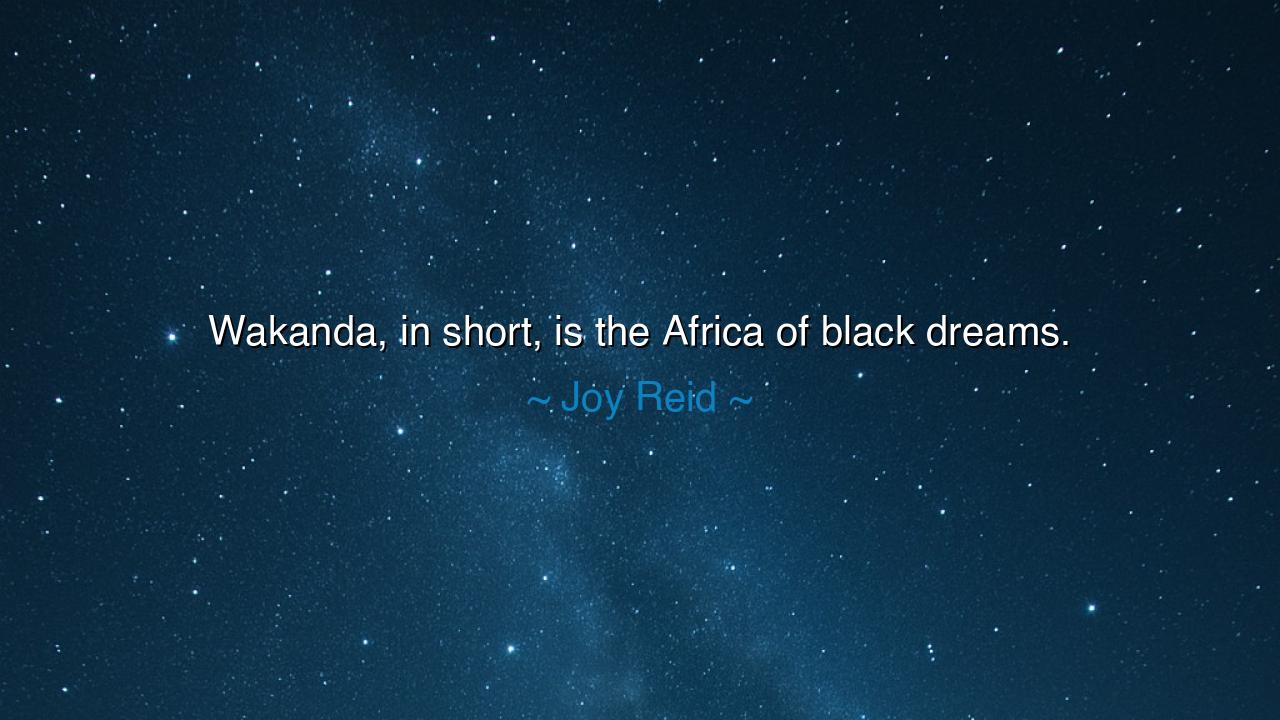
Wakanda, in short, is the Africa of black dreams.






“Wakanda, in short, is the Africa of black dreams.” — Joy Reid
Listen well, O seekers of truth, for within this simple phrase lies the beating heart of a people’s dream—a dream born from centuries of longing, pain, and unbroken spirit. When Joy Reid spoke of Wakanda, she did not speak merely of a place made of fiction, but of a realm made of memory, hope, and vision. She named it “the Africa of black dreams,” not because it exists upon any map, but because it lives in the hearts of those who still believe that greatness once known can rise again. Wakanda is not the invention of fantasy—it is the remembrance of possibility, the whisper of a truth too long buried by the world’s forgetfulness.
In the sacred tapestry of human history, Africa was once the cradle of light. It birthed empires that shimmered like suns—Mali, Kush, Songhai, Ethiopia—kingdoms of wisdom and artistry, where gold flowed like rivers and knowledge was prized as treasure. Yet in the ages that followed, chains of iron and chains of story sought to shatter her image. The colonizers, fearing what they could not comprehend, cloaked her in darkness, speaking lies until her children forgot the sound of her ancient names. It is against this backdrop of wounds and silencing that Wakanda arose—a vision not of what Africa is seen to be, but what it could have been had history been just.
When Marvel’s Black Panther appeared before the eyes of the world, something ancient stirred in the souls of millions. Here was a kingdom unbroken by slavery, untouched by conquest, radiant with knowledge, power, and dignity. For the first time, a mirror was lifted before the African diaspora, reflecting not suffering, but sovereignty; not weakness, but wisdom. Children across the earth saw kings and queens who bore their skin, their curls, their beauty—and they felt the surge of belonging. Wakanda became a symbol, a sacred dreamscape where blackness was not a burden but a birthright of glory.
Yet do not mistake this dream for an escape. Wakanda is not a flight from the real—it is a reclamation of it. It is the soul’s rebellion against the world’s diminished imagination. It is the collective act of saying: “We are more than what history has written of us.” In that act lies the power of vision—for every transformation begins first in the unseen, in the dream. When a people can imagine their wholeness, they begin to rebuild it. When they can picture their greatness, they begin to live it.
Consider the story of Nelson Mandela, who from the darkness of a prison cell dreamed not of vengeance, but of a free and unified South Africa. His dream was a kind of Wakanda of the spirit—a vision of black and white standing as one beneath the same sun. They called him a dreamer, but his dream, like the movie’s mythic nation, became a blueprint for liberation. And so we see: the dream that begins in the heart may yet shape the world.
Joy Reid’s words remind us that imagination is not idle—it is the most revolutionary act of all. To dream of a better Africa, a truer identity, is to challenge every chain still clinging to the mind. When a child sees Wakanda and whispers, “That could be us,” a sacred inheritance awakens. Such dreams heal what centuries have sought to destroy. They teach that the black spirit was never broken—only waiting for the dawn to remember itself.
Therefore, O listeners of tomorrow, hold fast to your dreams, but let them be active dreams. Build your Wakanda not in fantasy, but in the work of your hands, the brilliance of your thought, the courage of your unity. Study your history. Love your culture. Create, protect, and rise. For Wakanda is not a faraway land—it is a mirror held before the African soul, whispering, “This is who you truly are.” When you believe it, when you build it, when you live it, then the dream will cease to be a dream. It will become reality reborn.






AAdministratorAdministrator
Welcome, honored guests. Please leave a comment, we will respond soon